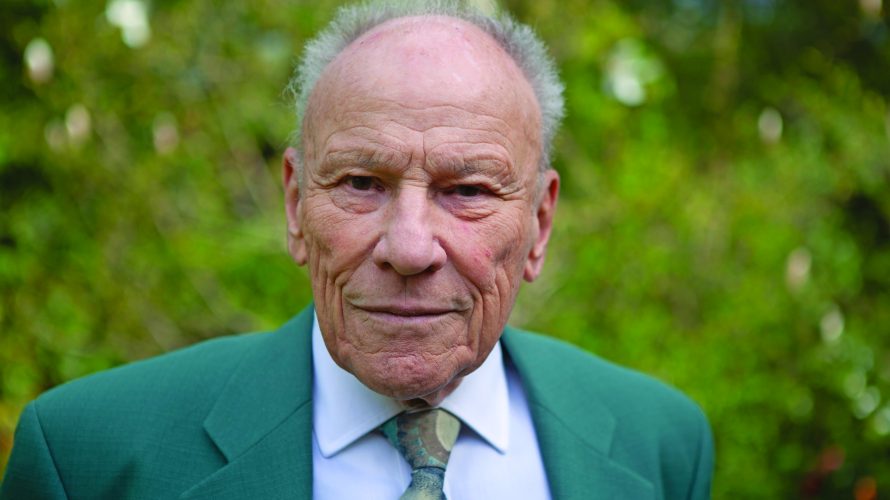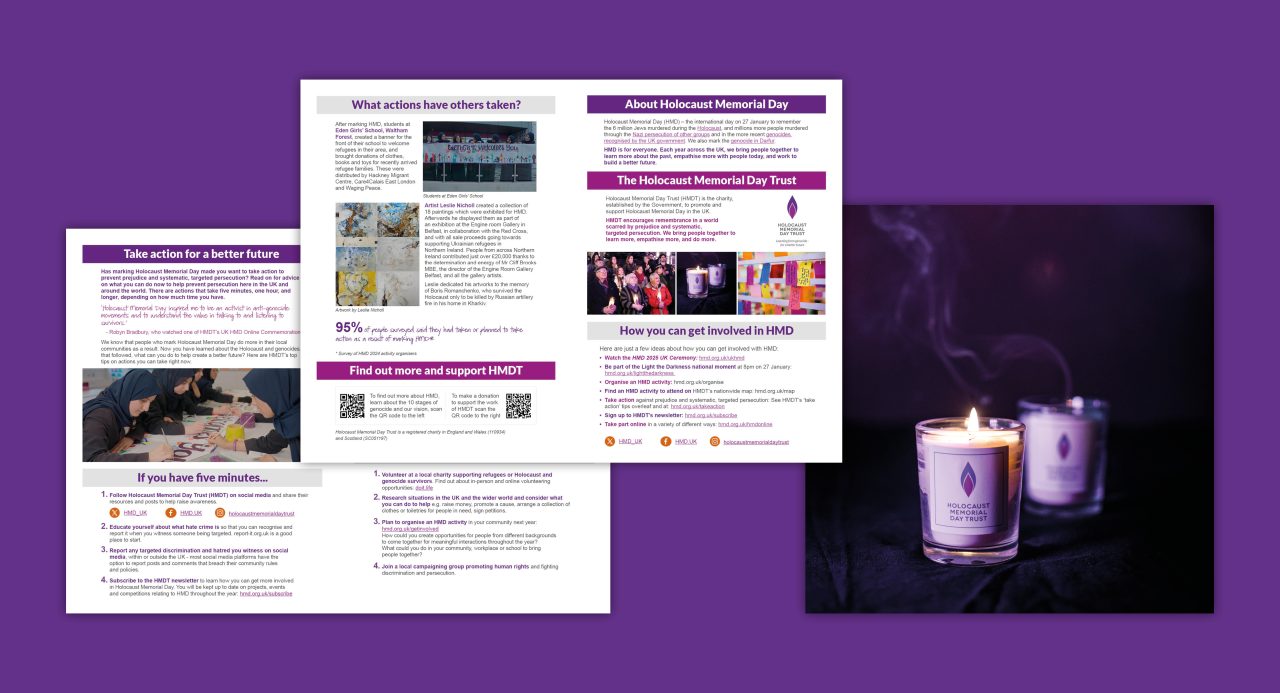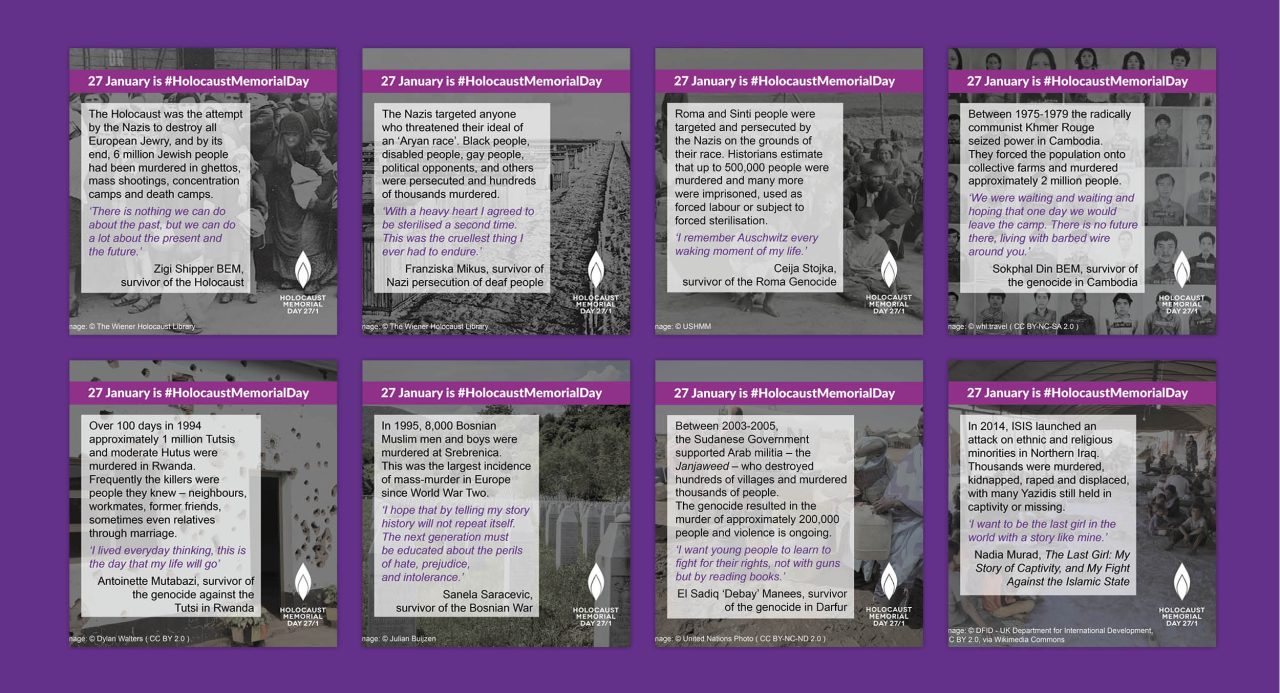HMDT blog: Five ways to include survivor experiences in your HMD activity
This Holocaust Memorial Day (HMD), we will come together to learn and remember. One way to engage in meaningful conversation around HMD is to share and listen to survivor experiences. This blog will show you five different ways you could use survivor experiences in your HMD activity this year.

Image: Joan Salter MBE, a child survivor of the Holocaust, lighting a candle for Light the Darkness 2024 © Sam Churchill / Holocaust Memorial Day Trust.
Holocaust Memorial Day (HMD) is an opportunity to come together to learn, remember and take action to create the better future we want, a better future where people are not suffering prejudice or persecution because of their faith, ethnicity, or other characteristics. One way to engage your community with HMD is by using survivor experiences from the Holocaust, Nazi persecution of other groups, the genocide in Darfur and more recent genocides recognised by the UK government to educate in a meaningful and empathetic way.
1. Hold a listening circle where you read a survivor’s testimony
The theme for HMD 2025 is For a Better Future. Life stories can be powerful tools for listening circles, discussions, and talks around this topic; by reflecting on the impact of persecution and discrimination, drawing parallels between experiences, and sharing personal narratives, we can engage in meaningful conversations. These discussions support groups learning about the past, empathising more with people today, and applying what they have learnt to build a better future. These conversations can be relevant for all organisations. For classrooms, our lesson plan on persecution and discrimination can support further engagement whilst using life stories in an accessible way.
2. Use recorded life stories as part of your ceremony or presentation
We have a large collection of survivor testimonies in video form. Some of these videos are survivors giving their own or others’ testimonies and some are films that explore the experiences of individuals and communities in more creative ways. These films are an excellent way for a range of ages and organisations to engage with life stories and can be used to engage in discussions, to add an extra level of meaning to a ceremony, or to educate a group on a new topic.

Portrait of Ben Abeles, Kindertransport refugee, by Claire Elizabeth Jackson
3. Use life stories as inspiration for art or poetry
Life stories can inspire many people; having listened to life stories you may feel inspired to create something. Our [Extra]ordinary portraits resource can help you create a portrait of the survivor whose story you have read or heard. Previously, the [Extra]ordinary portraits project was a competition which went on to create this digital exhibition which can be used as part of your HMD activities.
4. Write a letter to the survivor whose life story you have read or heard
Following a reading of a life story, you may have questions or thoughts about what you have heard. Individually, or as a group, you could write to your local MP or another relevant organisation to tell them about the survivors’ experience and the importance of learning about them. Letters are a great way to share your thoughts and opinions on a topic and a way to take action to support causes in your area. For younger audiences, you could use this activity to write down what they would like to say to the survivor if they could.
5. Light a candle as part of our ‘Light the Darkness’ national moment
We have many life stories on our website, and we have created Memorial Pages to honour and remember all those who endured the Holocaust, Nazi persecution of other groups and more recent genocides recognised by the UK government and the genocide in Darfur . You can also you create your own memorial page as a lasting tribute for a someone affected by genocide. As part of our ‘Light the darkness’ national moment, at 8pm on 27 January, we encourage you to light a candle to remember those who were murdered for who they were and stand against prejudice and hatred today.
All these activities can be supported using social media. Don’t forget to tag us on X, Facebook or Instagram and tell us how you are marking HMD 2025 .
#HolocaustMemorialDay
#HMD2025
#ForABetterFuture


